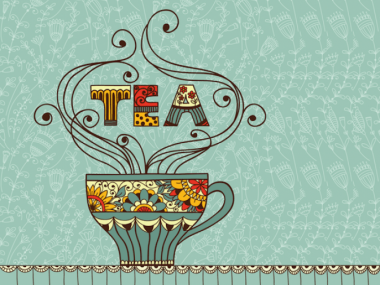What Is the Meaning of ‘Blue Blood’ (and Other ‘Blue’ Phrases)?
English has many idioms tied to color. Today, we’ll look at “blue.”
Today’s episode is a fun look at the color blue and 10 different meanings of or associations with that word.
1. Blue Democrats
First up is politics. Whenever there’s an election in the United States, we hear about red states and blue states. These days, red refers to Republican, or conservative, states, whereas blue connotes Democratic, or more liberal, states. (1) Labeling the states with such partisan colors began with the TV station NBC, the first all-color network, in 1976. (2) The anchor explained how states that voted for the Republican incumbent, Gerald Ford, were going to be blue and those in favor of the Democratic challenger, Jimmy Carter, would be red. (The opposite of how we think of it today.)
In subsequent elections, other TV stations adopted their own color schemes. No official standard was adopted, however, and so the public became confused. It wasn’t until 2000 that red definitively meant Republican and blue Democratic in political discourse and on TV.
2. Blue in the Face
Number two on our list is blue in the face. When someone does something until she is blue in the face, she is feeling frustrated and exasperated. For example, a mother can tell her slovenly son to clean up his room until she is blue in the face; unfortunately, in this case, the room will probably stay messy. The meaning of blue in this expression originates in medicine. (3) When someone is deprived of oxygen, such as when talking breathlessly or angrily, the skin turns bluish. Let’s try not to deplete our oxygen levels!
3. Blue Chip
Our third phrase or expression containing the color blue refers to money. The phrase blue chip, as in blue chip stocks, refers to large, well-established companies that are likely to be household names and to pay dividends to stockholders. (4) Examples are cereal maker General Mills and package deliverer United Parcel Service. (5) In 1904, blue chip came to mean of high value (6) and 20 years later came to be associated with valuable companies. Why blue and not some other color? Because at the turn of the 20th century, blue poker chips were very valuable. (6) Nowadays, the highest-value chips, worth $5,000, are brown, with blue chips being worth just $10 apiece. (7) So maybe we should start talking about brown chip stocks instead.
4. Blue Plate Special
Next on our list is the blue plate special. This phrase refers to a daily special that is a complete meal at a reduced price. The origin is uncertain, but it may refer to a plate that was actually blue. When you go to a diner for a blue plate special, your meal might be served on a blue plate with several sunken compartments for “potatoes, meat, and greens.” (8) Dictionary.com tells us the phrase blue plate originates from 1940 to 1945, (9) but it may be 50 or so years older than that. In the 1890s, the Fred Harvey Company developed a chain of restaurants that serviced various railroad routes as well as the dining cars themselves, and the restaurants used “faux-Wedgwood plates with a blue design.” (10)
5. Blue Blood

The expression blue blood, which originates from 1809, (14) refers to a person of noble origin. It seems that members of the Spanish royalty wanted to claim that their blood was pure—in their case, free of Moorish or Jewish ancestry. It is also possible that the association between blue and royalty stems from the simple fact that the blood in the veins of pale individuals appears blue through the skin. (15) Two medical disorders may be also relevant to the association between blue and regality. One is called argyria, a condition that turns the skin a bluish color because of chronic exposure to silver. (16) Silver is expensive and was more likely to be used by rich people than the masses. The second disorder can be traced back thousands of years. It seems that there are blue-skinned mummies from Egypt, (17) and perhaps the lack of genetic diversity among the ancient elite caused a disorder called methemoglobinemia. The skin of individuals with this problem is slate gray-blue. (18) Let’s hope these conditions become even more rare, the next meaning of blue.
6. Blue Moon
If you want to indicate that something happens rarely, then you might use the phrase once in a blue moon. In an extremely rare case, the moon might actually look blue after a volcanic eruption because of the dust particles in the air, (19) but that likely isn’t the origin of the expression. This phrase goes as far back as Medieval England and originally meant impossible, as in when pigs fly. Nowadays, on the other hand, the term blue moon describes a real—and rare—astronomical phenomenon, and once in a blue moon has had the meaning rare since around 1821. (19) There are actually two scientific definitions of a blue moon. First, there are four astronomical seasons: spring, summer, fall, and winter, and each season normally has three full moons. When there is a fourth full moon in one season, the third moon that season is called a blue moon, and according to timeanddate.com, (20) this is the correct definition. The second definition of blue moon is a second full moon in one month. Whichever meaning you wish to use, a blue moon will not happen often. According to the first definition on timeanddate.com, there will be blue moons in May 2016, May 2018, August 2021, and August 2024; according to the second, blue moons will occur in January and March 2018 and in October 2020.
7. Blue Movie
The seventh meaning of blue is pornographic, as in the phrase blue movie. The word blue has meant obscene since the 1820s, (21) and Dictionary.com’s 17th definition of blue is “marked by blasphemy.” (22) The origins of this association with the color blue are murky. Two theories (21) are that it is related to the blue gowns that ladies of the night were made to wear when imprisoned, and that certain undesirable French books were bound in blue paper covers. Another phrase associated with off-color language is blue humor, which refers to dirty jokes. (23) Comedians such as Andrew Dice Clay are known for this kind of comedy.
8. Blue Laws
It’s interesting that the next meaning of blue is the polar opposite of what we just said, in this case puritanical. (24) The term blue laws refers to state or local laws that prohibit certain activities on Sundays, and many of these laws came about because of religious ideals. (25) For example, some blue laws prevented stores from being open, did not permit merchants or laborers to work, and prohibited the sale of liquor and tobacco on Sundays. Some blue laws are still in force. The origin of the term is unclear. (26) One theory is that it comes from the color of the paper on which these laws were written, but that does not seem to be true. Perhaps it is related to the term bluenose, which means a puritanical person. (27)
9. Feeling Blue
Two more meanings of blue to go. The next to last meaning is perhaps the most common connotation: When you’re feeling blue, you’re sad. This melancholy meaning of blue has been around since 1385, when Chaucer used the term. (28) A related idiom is in a blue funk. (29) Some people suffer from seasonal affective disorder, appropriately abbreviated SAD, where sufferers start being depressed around fall, and the feeling continues through the winter. (30) These people might experience what’s known as a blue Christmas, a sad Christmas, (31) and Elvis sang a song with this title. (32) We hope that this holiday season is joyful for you instead of blue.
10. Blue Hanukkah
Which brings us to our last tidbit about the color blue. This color, along with the color white, is widely associated with the Jewish holiday Hanukkah. The reason might seem obvious to those who know that the Israeli flag is blue and white. This flag was designed in 1891 and adopted in 1948. (33) The flag’s stripes are blue because they represent the blue thread that the Torah commands be used on the fringe of the prayer shawl known as a tzitzit. (34) The dye that makes the thread blue comes from a shellfish that lives in the Mediterranean Sea. (34) Also, according to tradition, the Ten Commandments were inscribed on blue sapphire stone.
We hope that you’ve enjoyed this colorful episode. Happy Holidays!
Bonnie Mills is the author of The Curious Case of the Misplaced Modifier and blogs at sentencesleuth.blogspot.com.
[Correction Note: This article originally said that a blue moon is the fourth full moon in a season instead of the third full moon in a season that has four.]
References
1. Forbes.com. “Solved: Why Poor States Are Red and Rich States Are Blue.” https://www.forbes.com/sites/timworstall/2015/01/04/solved-why-poor-states-are-red-and-rich-states-are-blue/. Accessed November 16, 2015.
2. NPR.org. “The Color Of Politics: How Did Red And Blue States Come To Be?” https://www.npr.org/2014/11/13/363762677/the-color-of-politics-how-did-red-and-blue-states-come-to-be. Accessed November 16, 2015.
3. The Free Dictionary.com. “Blue in the face.” https://idioms.thefreedictionary.com/blue+in+the+face. Accessed November 16, 2015.
4. Investopedia. “Blue-Chip Stock.” https://www.investopedia.com/terms/b/bluechipstock.asp. Accessed November 16, 2015.
5. Forbes.com. “10 Century-Old Blue Chip Stocks Still Earning Their Keep.” https://www.forbes.com/sites/thestreet/2012/06/11/10-century-old-blue-chip-stocks-still-earning-their-keep/. Accessed November 16, 2015.
6. The Motley Fool. “Where’d the Term ‘Blue Chip’ Come From?” https://www.fool.com/investing/general/2004/09/24/whered-the-term-blue-chip-come-from.aspx. Accessed November 16, 2015.
7. About.com. “Standard Poker Chip Denominations.” https://boardgames.about.com/od/poker/a/chip_denoms.htm. Accessed November 16, 2015.
8. Superbeefy.com. “What Does the Expression ‘Blue Plate Special’ Mean and Where Did the Phrase Originate?” https://superbeefy.com/what-does-the-expression-blue-plate-special-mean-and-where-did-the-phrase-originate/. Accessed November 16, 2015.
9. Dictionary.com. “Blue plate.” https://dictionary.reference.com/browse/blue-plate?s=t. Accessed November 16, 2015.
10. The Word Detective. “Blue Plate Special.” https://www.word-detective.com/2011/12/blue-plate-special/. Accessed November 16, 2015.
11. Brownielocks.com. “Who Came Up With That One?” https://www.brownielocks.com/wordorigins.html. Accessed November 16, 2015.
12. Dictionary.com. “Blue ribbon.” https://dictionary.reference.com/browse/blue-ribbon. Accessed November 16, 2015.
13. Webexhibits.org. Pigments through the Ages. “Symbolism of the Color Blue.” https://www.webexhibits.org/pigments/intro/blues.html. Accessed November 16, 2015.
14. Online Etymology Dictionary. “Blue blood.” https://www.etymonline.com/index.php?term=blue+blood. Accessed November 16, 2015.
15. Quora.com. “How did the term ‘Blue Blood’ come about?” https://www.quora.com/How-did-the-term-Blue-Blood-come-about. Accessed November 16, 2015.
16. Royal Society of Chemistry website. “Chemistry behind the ‘blue man’ unlocked.” https://www.rsc.org/chemistryworld/2012/11/chemistry-blue-man-argyria-colloidal-silver. Accessed November 16, 2015.
17. Abovetopsecret.com. “Blue skinned mummies and the Royal Blue Bloodline.” https://www.abovetopsecret.com/forum/thread995172/pg1. Accessed November 16, 2015.
18. MedicineNet.com. “Definition of Methemoglobinemia.” https://www.medicinenet.com/script/main/art.asp?articlekey=15735. Accessed November 16, 2015.
19. Phrases.org. “Once in a blue moon.” https://www.phrases.org.uk/meanings/once-in-a-blue-moon.html. Accessed November 16, 2015.
20. Timeanddate.com. “When is the Next Blue Moon?” https://www.timeanddate.com/astronomy/moon/blue-moon.html. Accessed November 16, 2015.
21. World Wide Words website. “Blue.” https://www.worldwidewords.org/qa/qa-blu2.htm. Accessed November 16, 2015.
22. Dictionary.com. “Blue.” https://dictionary.reference.com/browse/blue. Accessed November 16, 2015.
23. About.com. “Blue Humor.” https://comedians.about.com/od/glossary/g/bluehumor.htm. Accessed November 16, 2015.
24. OxfordDictionaries.com. “Blue.” https://www.oxforddictionaries.com/us/definition/american_english/blue. Accessed November 16, 2015.
25. The Free Dictionary.com. “Blue Laws.” https://legal-dictionary.thefreedictionary.com/Blue+Laws. Accessed November 16, 2015.
26. Snopes.com. “Blue Laws.”https://www.snopes.com/language/colors/bluelaws.asp. Accessed November 16, 2015.
27. The Free Dictionary.com. “Bluenose.”https://www.thefreedictionary.com/bluenose. Accessed November 16, 2015.
28. Dictionary.com. “Have the blues.” https://dictionary.reference.com/browse/have-the-blues. Accessed November 16, 2015.
29. Dictionary.com. “In a blue funk.” https://dictionary.reference.com/browse/blue-funk-in-a.
Accessed November 16, 2015.
30. Mayo Clinic website. “Seasonal affective disorder (SAD)” https://www.mayoclinic.org/diseases-conditions/seasonal-affective-disorder/basics/definition/con-20021047. Accessed November 16, 2015.
31. UrbanDictionary.com. “Blue Christmas.” https://www.urbandictionary.com/define.php?term=Blue+Christmas. Accessed November 16, 2015.
32. SongFacts.com. “Blue Christmas by Elvis Presley.” https://www.songfacts.com/detail.php?id=2407. Accessed November 16, 2015.
33. MentalFloss.com. “Why Are Blue and White the Hanukkah Colors?” https://mentalfloss.com/article/31820/why-are-blue-and-white-hanukkah-colors. Accessed November 16, 2015.
34. Chabad.org. “Techelet (Blue Thread).” https://www.chabad.org/library/article_cdo/aid/530127/jewish/Techelet-Blue-Thread.htm. Accessed November 16, 2015.





